Analyzing the Impact of Culture, Gender, and Power on Hospitality
VerifiedAdded on 2023/01/06
|6
|1664
|61
Essay
AI Summary
This argumentative essay delves into the multifaceted realm of host-guest interactions within the hospitality industry. It begins by defining hospitality and its significance, emphasizing the relational dynamics between hosts and guests. The essay explores the influence of cultural and religious differences, gender roles, and power dynamics on these interactions, providing real-world examples to illustrate its points. Furthermore, it examines Lashley's Three Domains of Hospitality: social, private/domestic, and commercial, highlighting their distinct characteristics and impacts on guest experiences. The essay concludes by summarizing the factors affecting host-guest relationships and reinforces the importance of fostering positive interactions within the hospitality sector. The essay uses references to support arguments.
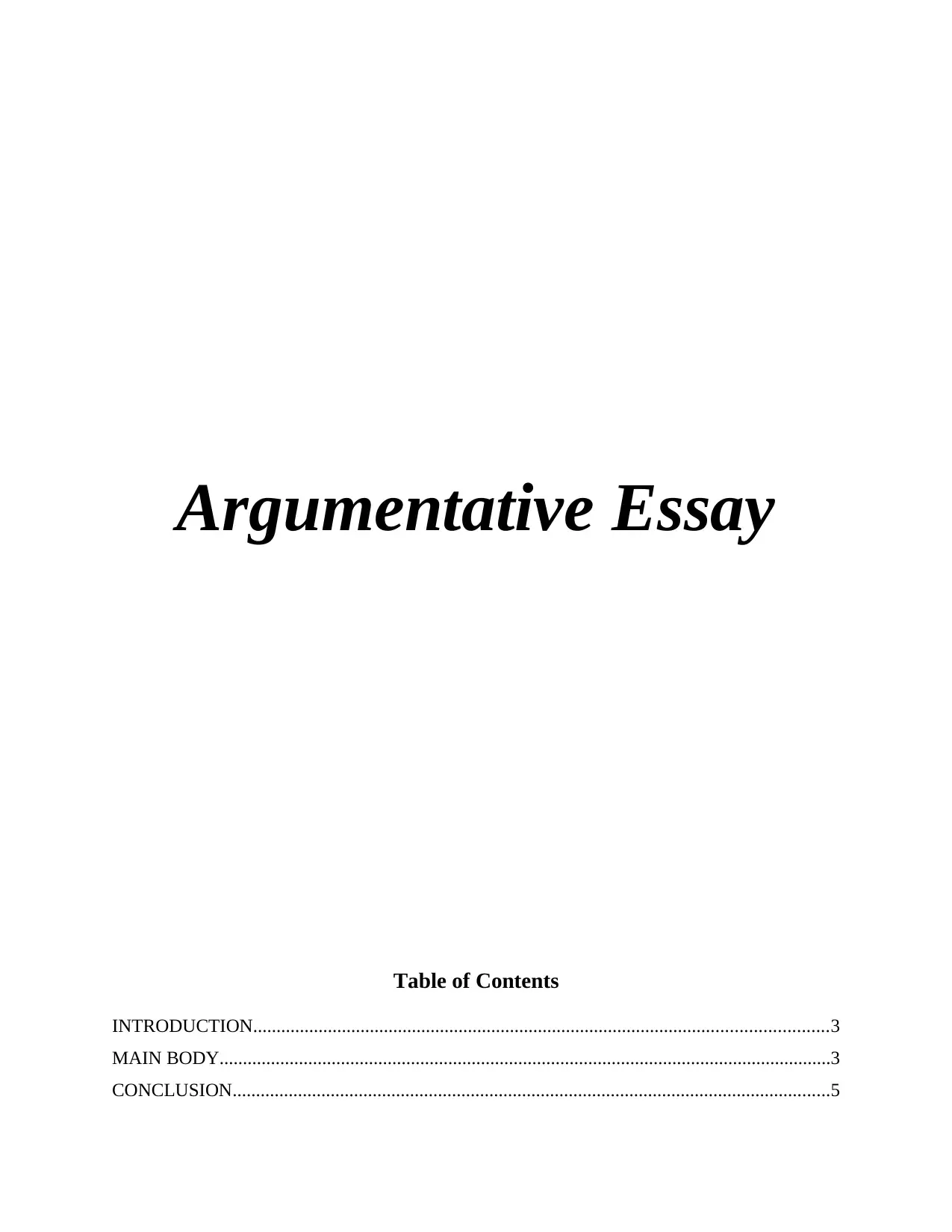
Argumentative Essay
Table of Contents
INTRODUCTION...........................................................................................................................3
MAIN BODY...................................................................................................................................3
CONCLUSION................................................................................................................................5
Table of Contents
INTRODUCTION...........................................................................................................................3
MAIN BODY...................................................................................................................................3
CONCLUSION................................................................................................................................5
Paraphrase This Document
Need a fresh take? Get an instant paraphrase of this document with our AI Paraphraser

REFERENCES................................................................................................................................6
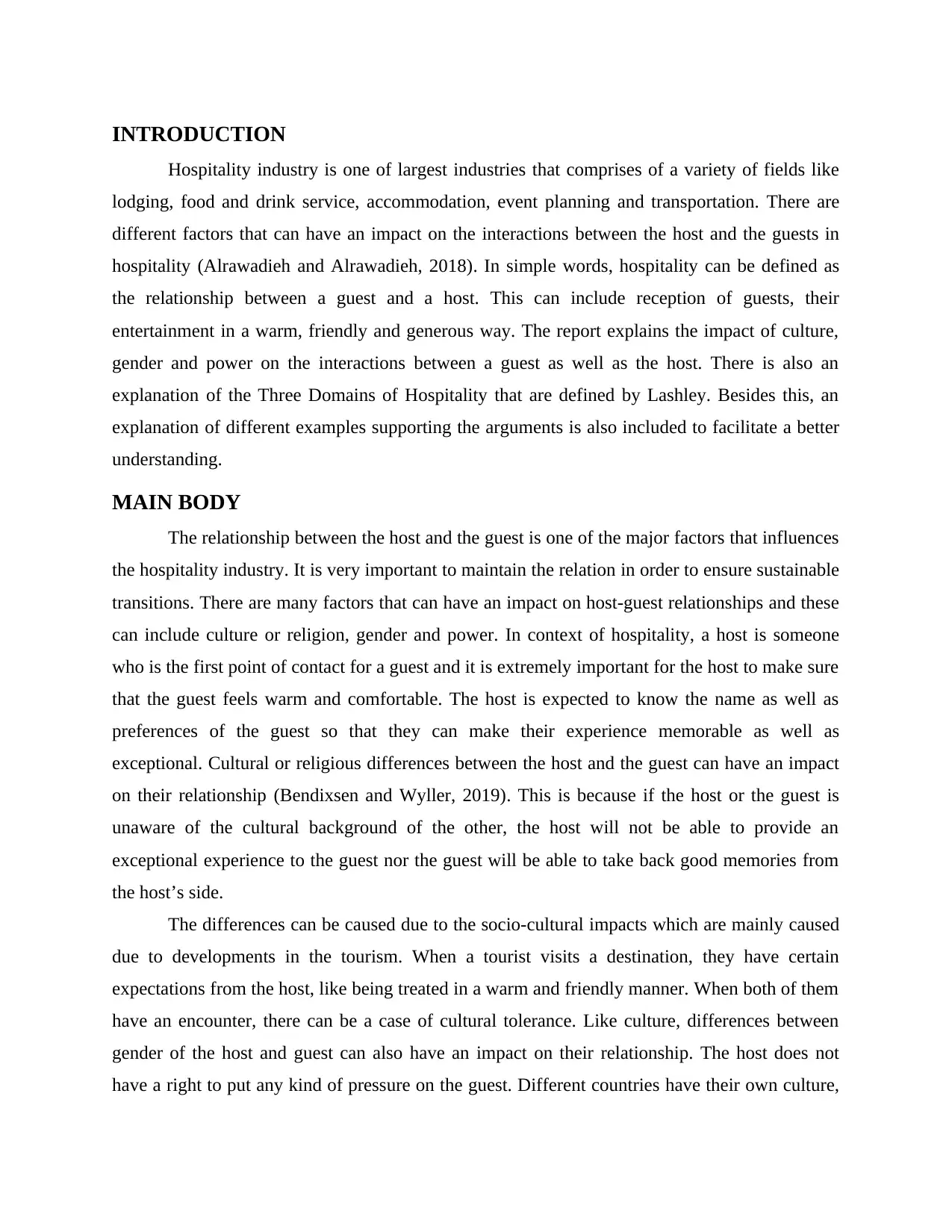
INTRODUCTION
Hospitality industry is one of largest industries that comprises of a variety of fields like
lodging, food and drink service, accommodation, event planning and transportation. There are
different factors that can have an impact on the interactions between the host and the guests in
hospitality (Alrawadieh and Alrawadieh, 2018). In simple words, hospitality can be defined as
the relationship between a guest and a host. This can include reception of guests, their
entertainment in a warm, friendly and generous way. The report explains the impact of culture,
gender and power on the interactions between a guest as well as the host. There is also an
explanation of the Three Domains of Hospitality that are defined by Lashley. Besides this, an
explanation of different examples supporting the arguments is also included to facilitate a better
understanding.
MAIN BODY
The relationship between the host and the guest is one of the major factors that influences
the hospitality industry. It is very important to maintain the relation in order to ensure sustainable
transitions. There are many factors that can have an impact on host-guest relationships and these
can include culture or religion, gender and power. In context of hospitality, a host is someone
who is the first point of contact for a guest and it is extremely important for the host to make sure
that the guest feels warm and comfortable. The host is expected to know the name as well as
preferences of the guest so that they can make their experience memorable as well as
exceptional. Cultural or religious differences between the host and the guest can have an impact
on their relationship (Bendixsen and Wyller, 2019). This is because if the host or the guest is
unaware of the cultural background of the other, the host will not be able to provide an
exceptional experience to the guest nor the guest will be able to take back good memories from
the host’s side.
The differences can be caused due to the socio-cultural impacts which are mainly caused
due to developments in the tourism. When a tourist visits a destination, they have certain
expectations from the host, like being treated in a warm and friendly manner. When both of them
have an encounter, there can be a case of cultural tolerance. Like culture, differences between
gender of the host and guest can also have an impact on their relationship. The host does not
have a right to put any kind of pressure on the guest. Different countries have their own culture,
Hospitality industry is one of largest industries that comprises of a variety of fields like
lodging, food and drink service, accommodation, event planning and transportation. There are
different factors that can have an impact on the interactions between the host and the guests in
hospitality (Alrawadieh and Alrawadieh, 2018). In simple words, hospitality can be defined as
the relationship between a guest and a host. This can include reception of guests, their
entertainment in a warm, friendly and generous way. The report explains the impact of culture,
gender and power on the interactions between a guest as well as the host. There is also an
explanation of the Three Domains of Hospitality that are defined by Lashley. Besides this, an
explanation of different examples supporting the arguments is also included to facilitate a better
understanding.
MAIN BODY
The relationship between the host and the guest is one of the major factors that influences
the hospitality industry. It is very important to maintain the relation in order to ensure sustainable
transitions. There are many factors that can have an impact on host-guest relationships and these
can include culture or religion, gender and power. In context of hospitality, a host is someone
who is the first point of contact for a guest and it is extremely important for the host to make sure
that the guest feels warm and comfortable. The host is expected to know the name as well as
preferences of the guest so that they can make their experience memorable as well as
exceptional. Cultural or religious differences between the host and the guest can have an impact
on their relationship (Bendixsen and Wyller, 2019). This is because if the host or the guest is
unaware of the cultural background of the other, the host will not be able to provide an
exceptional experience to the guest nor the guest will be able to take back good memories from
the host’s side.
The differences can be caused due to the socio-cultural impacts which are mainly caused
due to developments in the tourism. When a tourist visits a destination, they have certain
expectations from the host, like being treated in a warm and friendly manner. When both of them
have an encounter, there can be a case of cultural tolerance. Like culture, differences between
gender of the host and guest can also have an impact on their relationship. The host does not
have a right to put any kind of pressure on the guest. Different countries have their own culture,
⊘ This is a preview!⊘
Do you want full access?
Subscribe today to unlock all pages.

Trusted by 1+ million students worldwide
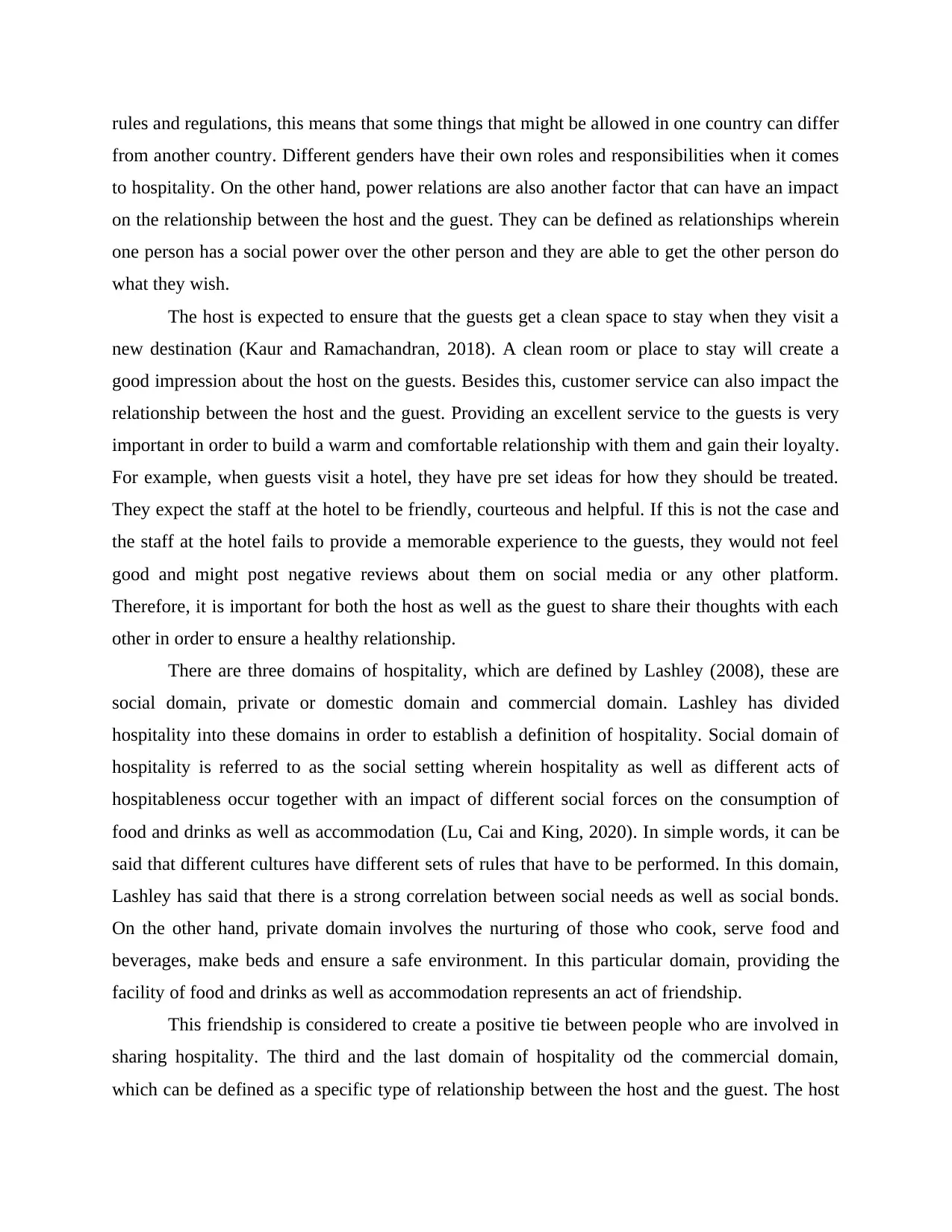
rules and regulations, this means that some things that might be allowed in one country can differ
from another country. Different genders have their own roles and responsibilities when it comes
to hospitality. On the other hand, power relations are also another factor that can have an impact
on the relationship between the host and the guest. They can be defined as relationships wherein
one person has a social power over the other person and they are able to get the other person do
what they wish.
The host is expected to ensure that the guests get a clean space to stay when they visit a
new destination (Kaur and Ramachandran, 2018). A clean room or place to stay will create a
good impression about the host on the guests. Besides this, customer service can also impact the
relationship between the host and the guest. Providing an excellent service to the guests is very
important in order to build a warm and comfortable relationship with them and gain their loyalty.
For example, when guests visit a hotel, they have pre set ideas for how they should be treated.
They expect the staff at the hotel to be friendly, courteous and helpful. If this is not the case and
the staff at the hotel fails to provide a memorable experience to the guests, they would not feel
good and might post negative reviews about them on social media or any other platform.
Therefore, it is important for both the host as well as the guest to share their thoughts with each
other in order to ensure a healthy relationship.
There are three domains of hospitality, which are defined by Lashley (2008), these are
social domain, private or domestic domain and commercial domain. Lashley has divided
hospitality into these domains in order to establish a definition of hospitality. Social domain of
hospitality is referred to as the social setting wherein hospitality as well as different acts of
hospitableness occur together with an impact of different social forces on the consumption of
food and drinks as well as accommodation (Lu, Cai and King, 2020). In simple words, it can be
said that different cultures have different sets of rules that have to be performed. In this domain,
Lashley has said that there is a strong correlation between social needs as well as social bonds.
On the other hand, private domain involves the nurturing of those who cook, serve food and
beverages, make beds and ensure a safe environment. In this particular domain, providing the
facility of food and drinks as well as accommodation represents an act of friendship.
This friendship is considered to create a positive tie between people who are involved in
sharing hospitality. The third and the last domain of hospitality od the commercial domain,
which can be defined as a specific type of relationship between the host and the guest. The host
from another country. Different genders have their own roles and responsibilities when it comes
to hospitality. On the other hand, power relations are also another factor that can have an impact
on the relationship between the host and the guest. They can be defined as relationships wherein
one person has a social power over the other person and they are able to get the other person do
what they wish.
The host is expected to ensure that the guests get a clean space to stay when they visit a
new destination (Kaur and Ramachandran, 2018). A clean room or place to stay will create a
good impression about the host on the guests. Besides this, customer service can also impact the
relationship between the host and the guest. Providing an excellent service to the guests is very
important in order to build a warm and comfortable relationship with them and gain their loyalty.
For example, when guests visit a hotel, they have pre set ideas for how they should be treated.
They expect the staff at the hotel to be friendly, courteous and helpful. If this is not the case and
the staff at the hotel fails to provide a memorable experience to the guests, they would not feel
good and might post negative reviews about them on social media or any other platform.
Therefore, it is important for both the host as well as the guest to share their thoughts with each
other in order to ensure a healthy relationship.
There are three domains of hospitality, which are defined by Lashley (2008), these are
social domain, private or domestic domain and commercial domain. Lashley has divided
hospitality into these domains in order to establish a definition of hospitality. Social domain of
hospitality is referred to as the social setting wherein hospitality as well as different acts of
hospitableness occur together with an impact of different social forces on the consumption of
food and drinks as well as accommodation (Lu, Cai and King, 2020). In simple words, it can be
said that different cultures have different sets of rules that have to be performed. In this domain,
Lashley has said that there is a strong correlation between social needs as well as social bonds.
On the other hand, private domain involves the nurturing of those who cook, serve food and
beverages, make beds and ensure a safe environment. In this particular domain, providing the
facility of food and drinks as well as accommodation represents an act of friendship.
This friendship is considered to create a positive tie between people who are involved in
sharing hospitality. The third and the last domain of hospitality od the commercial domain,
which can be defined as a specific type of relationship between the host and the guest. The host
Paraphrase This Document
Need a fresh take? Get an instant paraphrase of this document with our AI Paraphraser
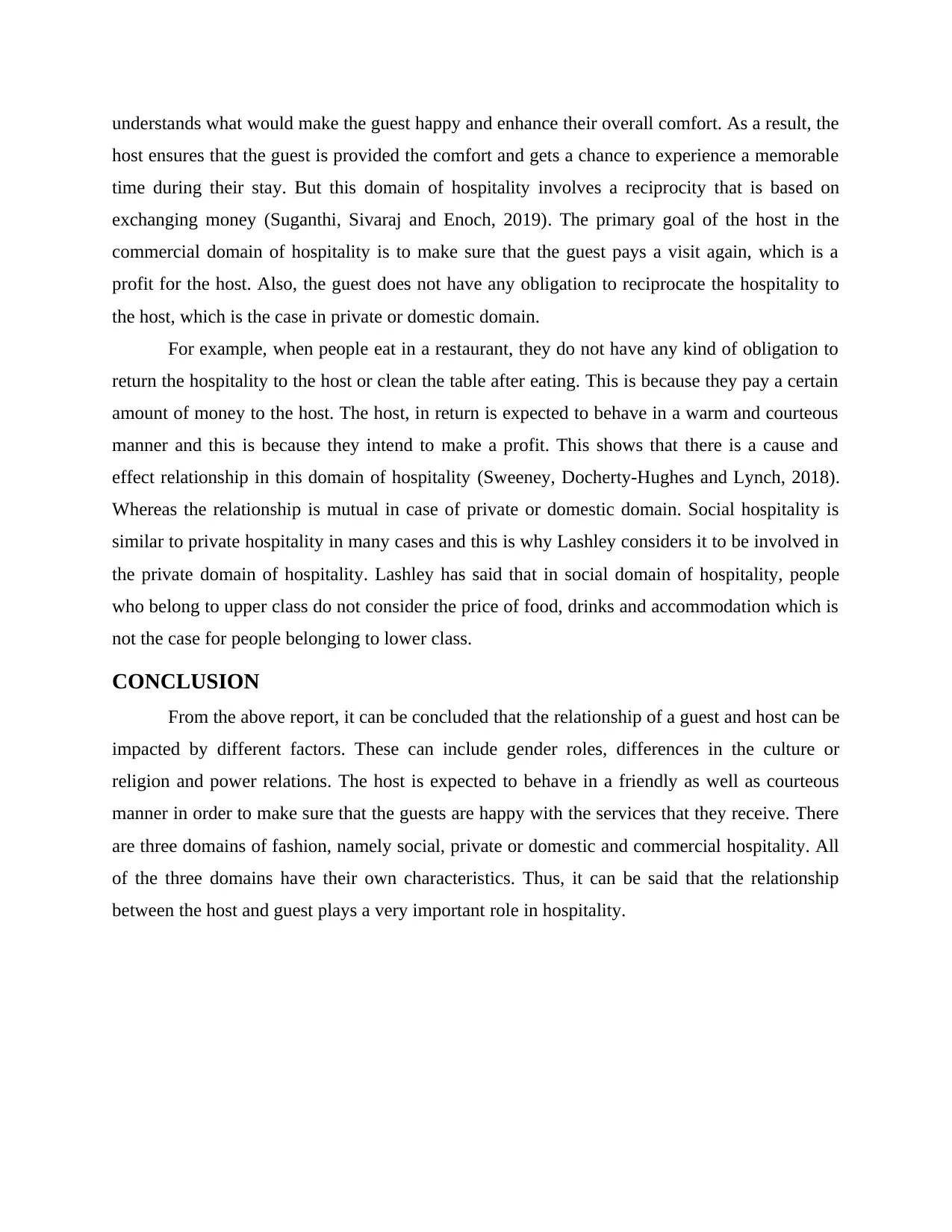
understands what would make the guest happy and enhance their overall comfort. As a result, the
host ensures that the guest is provided the comfort and gets a chance to experience a memorable
time during their stay. But this domain of hospitality involves a reciprocity that is based on
exchanging money (Suganthi, Sivaraj and Enoch, 2019). The primary goal of the host in the
commercial domain of hospitality is to make sure that the guest pays a visit again, which is a
profit for the host. Also, the guest does not have any obligation to reciprocate the hospitality to
the host, which is the case in private or domestic domain.
For example, when people eat in a restaurant, they do not have any kind of obligation to
return the hospitality to the host or clean the table after eating. This is because they pay a certain
amount of money to the host. The host, in return is expected to behave in a warm and courteous
manner and this is because they intend to make a profit. This shows that there is a cause and
effect relationship in this domain of hospitality (Sweeney, Docherty-Hughes and Lynch, 2018).
Whereas the relationship is mutual in case of private or domestic domain. Social hospitality is
similar to private hospitality in many cases and this is why Lashley considers it to be involved in
the private domain of hospitality. Lashley has said that in social domain of hospitality, people
who belong to upper class do not consider the price of food, drinks and accommodation which is
not the case for people belonging to lower class.
CONCLUSION
From the above report, it can be concluded that the relationship of a guest and host can be
impacted by different factors. These can include gender roles, differences in the culture or
religion and power relations. The host is expected to behave in a friendly as well as courteous
manner in order to make sure that the guests are happy with the services that they receive. There
are three domains of fashion, namely social, private or domestic and commercial hospitality. All
of the three domains have their own characteristics. Thus, it can be said that the relationship
between the host and guest plays a very important role in hospitality.
host ensures that the guest is provided the comfort and gets a chance to experience a memorable
time during their stay. But this domain of hospitality involves a reciprocity that is based on
exchanging money (Suganthi, Sivaraj and Enoch, 2019). The primary goal of the host in the
commercial domain of hospitality is to make sure that the guest pays a visit again, which is a
profit for the host. Also, the guest does not have any obligation to reciprocate the hospitality to
the host, which is the case in private or domestic domain.
For example, when people eat in a restaurant, they do not have any kind of obligation to
return the hospitality to the host or clean the table after eating. This is because they pay a certain
amount of money to the host. The host, in return is expected to behave in a warm and courteous
manner and this is because they intend to make a profit. This shows that there is a cause and
effect relationship in this domain of hospitality (Sweeney, Docherty-Hughes and Lynch, 2018).
Whereas the relationship is mutual in case of private or domestic domain. Social hospitality is
similar to private hospitality in many cases and this is why Lashley considers it to be involved in
the private domain of hospitality. Lashley has said that in social domain of hospitality, people
who belong to upper class do not consider the price of food, drinks and accommodation which is
not the case for people belonging to lower class.
CONCLUSION
From the above report, it can be concluded that the relationship of a guest and host can be
impacted by different factors. These can include gender roles, differences in the culture or
religion and power relations. The host is expected to behave in a friendly as well as courteous
manner in order to make sure that the guests are happy with the services that they receive. There
are three domains of fashion, namely social, private or domestic and commercial hospitality. All
of the three domains have their own characteristics. Thus, it can be said that the relationship
between the host and guest plays a very important role in hospitality.
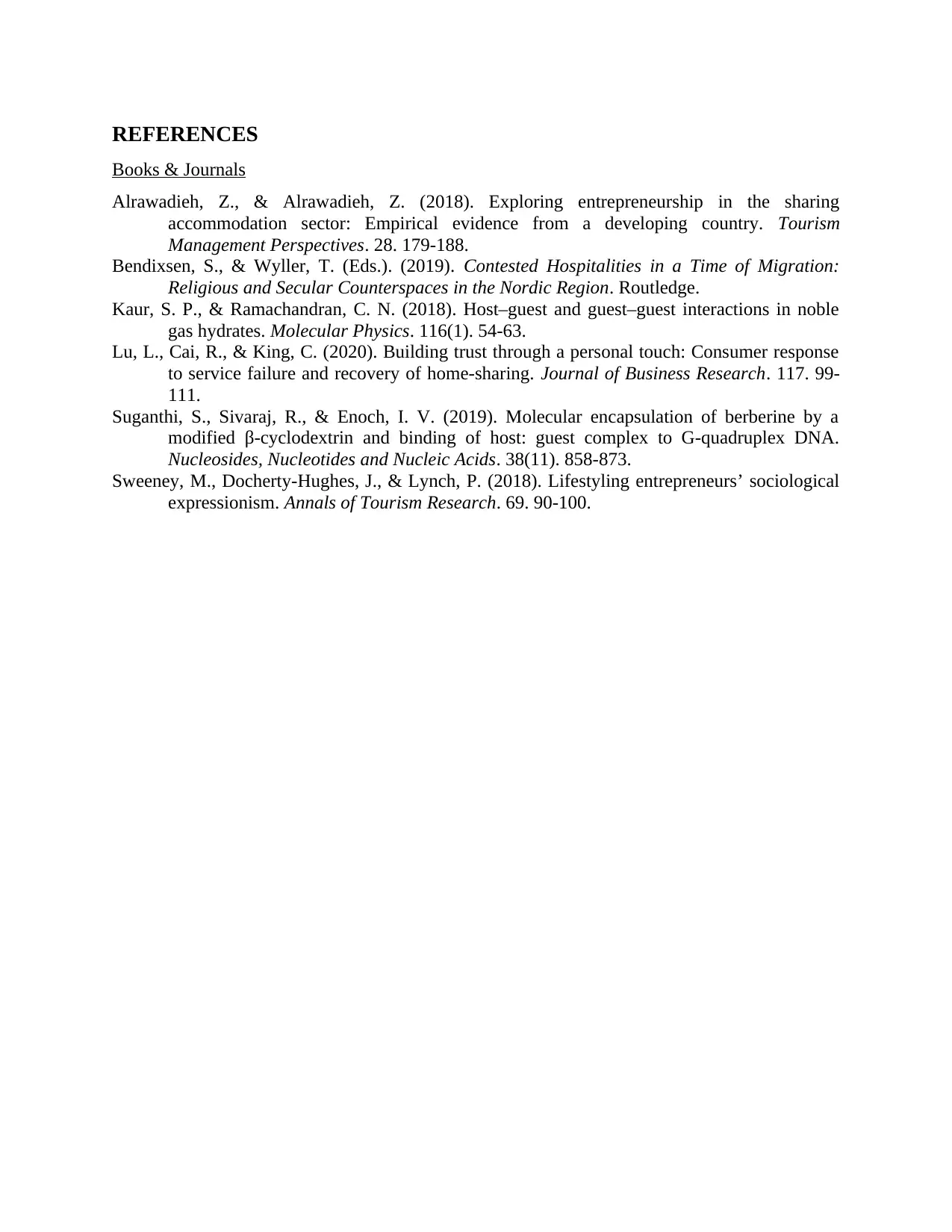
REFERENCES
Books & Journals
Alrawadieh, Z., & Alrawadieh, Z. (2018). Exploring entrepreneurship in the sharing
accommodation sector: Empirical evidence from a developing country. Tourism
Management Perspectives. 28. 179-188.
Bendixsen, S., & Wyller, T. (Eds.). (2019). Contested Hospitalities in a Time of Migration:
Religious and Secular Counterspaces in the Nordic Region. Routledge.
Kaur, S. P., & Ramachandran, C. N. (2018). Host–guest and guest–guest interactions in noble
gas hydrates. Molecular Physics. 116(1). 54-63.
Lu, L., Cai, R., & King, C. (2020). Building trust through a personal touch: Consumer response
to service failure and recovery of home-sharing. Journal of Business Research. 117. 99-
111.
Suganthi, S., Sivaraj, R., & Enoch, I. V. (2019). Molecular encapsulation of berberine by a
modified β-cyclodextrin and binding of host: guest complex to G-quadruplex DNA.
Nucleosides, Nucleotides and Nucleic Acids. 38(11). 858-873.
Sweeney, M., Docherty-Hughes, J., & Lynch, P. (2018). Lifestyling entrepreneurs’ sociological
expressionism. Annals of Tourism Research. 69. 90-100.
Books & Journals
Alrawadieh, Z., & Alrawadieh, Z. (2018). Exploring entrepreneurship in the sharing
accommodation sector: Empirical evidence from a developing country. Tourism
Management Perspectives. 28. 179-188.
Bendixsen, S., & Wyller, T. (Eds.). (2019). Contested Hospitalities in a Time of Migration:
Religious and Secular Counterspaces in the Nordic Region. Routledge.
Kaur, S. P., & Ramachandran, C. N. (2018). Host–guest and guest–guest interactions in noble
gas hydrates. Molecular Physics. 116(1). 54-63.
Lu, L., Cai, R., & King, C. (2020). Building trust through a personal touch: Consumer response
to service failure and recovery of home-sharing. Journal of Business Research. 117. 99-
111.
Suganthi, S., Sivaraj, R., & Enoch, I. V. (2019). Molecular encapsulation of berberine by a
modified β-cyclodextrin and binding of host: guest complex to G-quadruplex DNA.
Nucleosides, Nucleotides and Nucleic Acids. 38(11). 858-873.
Sweeney, M., Docherty-Hughes, J., & Lynch, P. (2018). Lifestyling entrepreneurs’ sociological
expressionism. Annals of Tourism Research. 69. 90-100.
⊘ This is a preview!⊘
Do you want full access?
Subscribe today to unlock all pages.

Trusted by 1+ million students worldwide
1 out of 6
Related Documents
Your All-in-One AI-Powered Toolkit for Academic Success.
+13062052269
info@desklib.com
Available 24*7 on WhatsApp / Email
![[object Object]](/_next/static/media/star-bottom.7253800d.svg)
Unlock your academic potential
Copyright © 2020–2025 A2Z Services. All Rights Reserved. Developed and managed by ZUCOL.





